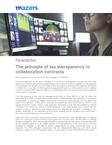
The principle of tax transparency in collaboration contracts
The principle of tax transparency
Fiscal transparency, as its name indicates, is a broad and philosophical concept that may have several connotations and definitions depending on the context in which it is applied. For the purposes of this analysis, we will take as the concept of fiscal transparency that which the legislator introduced in Article 127 of Law 1607 of 2012 (and later deepened through Law 1819 of 2016), which modified numeral 2 of Article 102 of the Tax Statute, a rule that determines the fiscal effects of the commercial trust contract in Colombia.
From the issuance of this rule, as indicated by the Dian in Oficio 020773 of July 15, 2015, the mercantile trust "fulfills a merely instrumental function of administration and, therefore, in front of the tax legislation -in income tax matters- the principle of economic reality prevails over the legal forms used in the business". In this sense, and after the deepening made by the last tax reform in this regard, the profits, losses, income, costs, expenses, incurred by a trust, with few exceptions, must be "included in the income tax returns of its beneficiaries, in the same taxable year in which they are caused in favor or against the autonomous patrimony, retaining the character of taxable or non-taxable, deductible or non-deductible and the same concept and tax conditions they would have if they were received directly by the beneficiary".
It was then clear, for all, that -as previously analyzed- the principle of fiscal transparency only applied within the framework of the commercial trust agreement. This was clear until the DIAN, in Concept 001283 of August 15, 2017, answered the question of whether the tax information certificate delivered by the managing partner to the hidden partner in the development of the joint account contract obviated the obligation of the latter to declare independently the items established therein. In its response, the DIAN indicated -surprisingly- that not independently declaring such items would indicate a violation of the "transparency regime incorporated as of law 1819 of 2016 on the matter".
It could be said, in grace of argument, that for certain specific contracts the fact that article 18 of law 1819 of 2016 has indicated that the parties to a business collaboration contract must declare the proportional part corresponding to them in the income, costs, expenses, assets and liabilities of the collaborative business, is indicative of the existence of a fiscal transparency regime in collaboration contracts. This could be the case, for example, of consortiums and joint ventures, where such dynamics works perfectly. What cannot be stated, under any circumstances, is that such principle applies to all business collaboration contracts, since the legal and functional nature of each one of them must first be studied to determine whether or not such principle applies to them.
As an example of the foregoing, it could be said that the principle of fiscal transparency is not applicable to the joint venture agreement (which is eminently a business collaboration agreement) since its legal and functional nature expressly prevents it. This is because the very existence of the joint venture accounts contract is based on the premise that one of its members is considered the owner of the business for all purposes (tax, legal and business) while the other remains hidden, and the disclosure of such quality before third parties entails the sanction of solidarity for all the obligations assumed in the participation. In this sense, providing transparency to such a contract is equivalent to nullifying its essence.
Likewise, the fiscal transparency rules are not applicable to the partnership contract (collaboration contract par excellence), since its raison d'être is precisely to limit the liability of the partners in the business in which the partnership is involved. In this sense, to pretend that the partners or shareholders of a company report as their own the assets, liabilities, income, profits and losses of the company, according to the participation they have in it, would be a contradiction in terms and a nonsense that clearly disregards the intention of the legislator.
In conclusion, although it may be considered that the principle of fiscal transparency applies to certain collaboration contracts, it is not possible to affirm that it applies to them, since the legal, business and functional nature of each one must be reviewed to see if such principle is compatible or not with its essence.


